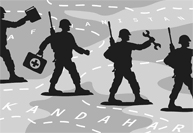P.O.V.
A test of our resolve
Why Canada's role in Afghanistan is essential
Like the new Conservative government, the Liberal opposition have now decided that Canada's commitment to the Kandahar region of Afghanistan will not be debated in Canada. The Liberals have a little more justification. Last year, while the media was fussing about a general election and whether journalists could get their Christmas shopping done, then-Defence Minister Bill Graham completed what his Chief of General Staff, General Rick Hillier, had already begun.

Tzigane
Canadians, explained Graham, had accepted the responsibility of operating a Provincial Reconstruction Team (PRT) and backing up the Hamid Karzai government in its most vulnerable regions. This would be much more dangerous than patrolling Kabul. At Kandahar, Canadians are much closer to the Pakistan border, where the Taliban and Al Qaeda smuggle in explosives, ammunition and fresh volunteers. This is where Mullah Omar has his most faithful followers. It is where Afghans of all shades of opinion crave the only agreed benefit of their pre-9/11 regime: security.
From the outset of the NATO-managed occupation of Afghanistan, PRTs have been the main hope of restoring peace, order and a tolerable environment to the people of Afghanistan. Only if local administrations can function in safety can police, schools, health services and basic sanitation be restored. From the first German-backed PRT, the model has developed. There have been no miracles and some setbacks, but no one has suggested a better solution other than flying away, leaving Afghans to the vengeance of their former rulers.
Often conquered, rarely held
As soon as elements of Canada's Joint Task Force appeared alongside Americans in the post-9/11 invasion of Afghanistan, we took our share of an awful burden. Through the millennia, Afghanistan has been easy to conquer and impossible to hold. The British Empire had two insoluble problems: Canada's border with the United States and the Northwest Frontier with Afghanistan. The British solved their American problem in 1871 when they pulled their garrison out of Quebec and went home. Not until Britain left a partitioned India could it forget Afghanistan.
In 1839, Britain sent an army of 19,000 troops and as many camp followers up the Khyber Pass to Kandahar and Kabul. A picture in a childhood book showed me Dr. Bryden returning to Peshawar in 1841, the sole survivor of Lord Elphinstone's army. That memory revived with our first commitment. I don't think it will happen again but it could. Canadian troops need more than armoured vehicles and Mr. Harper's invocation to God and faith in their rifles to bring a tolerable government to the Afghan people. More than anything, our success in Afghanistan depends on Canadian people being sympathetic, patient, and willing to make long-term sacrifices for people we have never met.
Victories beyond battlefield
We will have to compromise with resurgent warlords and an Afghan subsistence economy that supplies most of the world's heroin. We will have to persuade our soldiers and their commanders that their victories will be measured in children educated, houses built and chronic diseases controlled, not in "terrorist" body-counts. This will be tough. No wonder both Liberals and Conservatives want to avoid discussing it.
They are wrong. Most Canadians don't know what we have undertaken in a remote and tragic country. Harper's recent two-day Kandahar photo-op may have delighted George Bush and silenced the Liberals, but media tricks don't really change minds. Look where they have left American opinion on Iraq. If Parliament is the wrong place to talk, find a better forum. Harper's new government will deserve real credit only if it brings Canadians aboard for a voyage that may last years.
Desmond Morton is Hiram Mills Professor of History, author of A Military History of Canada and almost forty other books on Canadian political and military history. He has taught the Canadian Military Experience at McGill since 1994.

